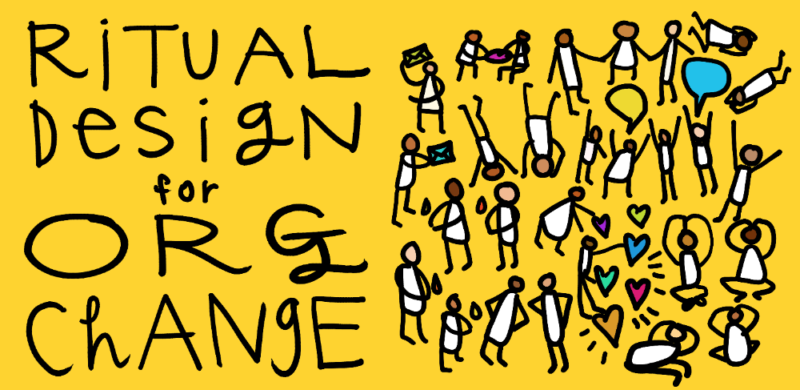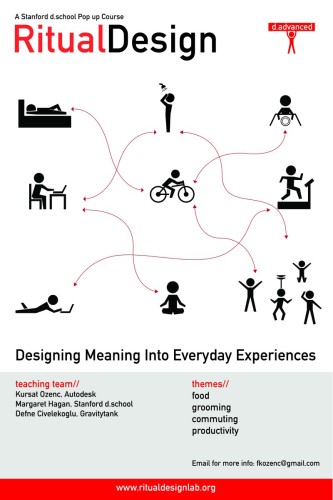Our team holds workshops and classes to create new rituals and to explore how designers can incorporate ritual methods into their work. Most of our classes are at Stanford’s Institute of Design (the d.school), where we teach Ritual Design.
Design For Business: How to Scale Org Culture- Winter 2023
The reset button was hit; COVID-19 accelerated work changes and the workforce’s reshuffling. Work is becoming more digital, distributed, remote, and in many ways, transactional. This is a pristine moment for small and big organizations to reimagine their cultures. This class will tackle how leaders and employees can build ethical, resilient, and people-first cultures by combining the fields of design and behavioral science.
This is a hands-on prototyping-driven studio where students will learn intentional culture design with partner orgs. This year’s culture design focus will be startups. Founders need to think of culture from day one. The momentum of a high-growth company makes it hard to set up the culture right and codify it for scaling. Students will tackle startup culture challenges and design culture experiments during the class by leveraging behavioral and experience design frameworks. Visit the class website.
Designing Organizational Culture– Fall 2021
From COVID-19 to racial injustice, lack of diversity to economic inequality, our current state of unsettledness presents both grand challenges and unprecedented opportunities for how we work and define work culture. This class will tackle how organizations can build strong, human-centered cultures to address the urgent challenges of our times.
Organizations’ culture matters because it affects the performance of the org’s teams and the individual’s satisfaction, well-being, and sense of meaning. Often, though, there is a gap in organizations’ culture. What an organization says it wants its culture to be (through mission statements, manifestos, constitutions, and otherwise) diverges from what people do in the workplace. Or the organization goes toward ‘default culture’, without considering what kind of culture would work for their teams and individuals. The human-centered design offers an approach to create a culture that is more intentional, more attuned to people’s needs, and with more of a bottom-up and participatory process. Check out the class website.
Talk To Me: Designing Human-AI Conversations for Wellbeing
Conversational AI agents are here to stay. Two out of three Americans reported that they interacted with conversational AI like Alexa or Siri in the last month or so. From virtual assistants to customer service chatbots and robot receptionists, these AI agents are rapidly growing, helping people navigate their lives. But as we move from human-human conversations to an increasing number of human-AI conversations, what are the new rules for engagement?
We know people rely upon interaction rituals in human-human conversation to establish standard norms and values. This class will explore new rituals emerging in human-AI conversation when norms are few, boundaries are undefined, and the “other” conversationalist (the AI) is not yet well understood.
How can people navigate this new kind of relationship in a reassuring, empowering, and delightful way?
This class will explore this important question in the context of designing a conversational AI agent for well-being, in the specific area of stress reduction. After learning some background in the key elements of conversation design, students will choose from a series of conversational opportunities in the well-being space. Then through dialogue crafting and design, we will attempt to establish some new rituals emerging in the field of human-AI conversation (i.e. openings, misunderstandings, turn-taking).
Ritual Design For Team’s Well-being
In Feb 2020, we had a pop-out class at Stanford Medicine focusing on the well-being of healthcare teams. Students created rituals to address care team challenges such as burn-out and community. You can read our Medium article about the class.
Ritual Design For Norwegian Football Fans
In September 2019, we ran ritual design sessions at Oslo School of Architecture’s Service Design department, partnering with the Norwegian Football Association. Our workshop was part of the service design’s studio projects. Students created rituals to increase bonding among Norwegian football fans.
Ritual Design For Better Workplaces
In Feb 2019, we taught 2 different pop-up courses, partnering with Airbnb. In this pop-up, the clas focused on building workplace rituals.
Designing Autonomous Car to Human Rituals
In Jan 2018, we taught a 2-session pop-up course, partnering with Stanford Center for Design Research. In this pop-up, we focused on the human to machine rituals. We welcomed students who were interested in how to create rich interactions in untapped territories of robots and artificial intelligence, and who want to explore humorous, strange, magical, and curious ways to do so.
Read our write-up of the results of the class –– how people think of their relationships with future smart cars, and what types of interactions help them build trust, control, and understanding of intelligent, autonomous cars.
Ritual Design for Orgs: Team Life Cycles
In October 2017, we will be taught a 2-session pop-up course, partnering with Microsoft. In this pop-up, we will go after rapid ritual design sprints and look for the high emotional energy zones within teams. We welcome students who are interested in how to create stronger cultures in their own orgs and companies, and who want to explore humorous, strange, magical, and curious ways to do so.
In Winter 2017, at Stanford d.school we offered a new class: Ritual Design for Organizational Change.
Rituals have a special power to bring people together and give them a sense of purpose, values, and meaning. Especially in the realms of sports, politics, and religion, rituals unite people and bring out deep emotions.
How can we harness this power of rituals in other kinds of organizations? In this pop-out we designed new rituals for a company, to explore how design methods and creative improvisation can help us craft more meaningful culture.
Students worked in teams to rapidly prototype new rituals for our partner company, and they will learn video storytelling techniques to capture their designs. We welcome students who are interested in how to create stronger cultures in their own orgs and companies, and who want to explore humorous, strange, magical, and curious ways to do so.
We were offered 2 separate sessions of our class Ritual Design: Designing Meaning into Everyday Experiences at Stanford d.school in February 2015.
Our daily lives are full of routines that give us comfort and stability, but also, can make us feel stagnated and bored. In this class, we will play with daily routines to see how to make them into meaningful delightful experiences. Meaningfulness could mean changing your behavior, building strong connections to people around you, connecting to your spirituality and higher values, or just creating a memorable time for yourself.
We will use rituals as our framework to design rich experiences around four everyday themes: food, grooming, productivity, and commuting. We will take existing routines, discover new meaning(s), and infuse ritual moments. Each student will develop and create their own ritual product, or service.
While building on the entire design process, in this class the focus will be on developing strong definition and ideation skills and using advanced tools such as experience/user journey mapping, abstract laddering and storyboarding. This class is for you if you are already comfortable with the design process but want to advance in crafting more nuanced design concepts.


Comments 5
… what a wonderfull concept! i’m visiting professor for service design studies development at south valley university/faculty fine arts luxor [egypt] and would like to contact, cooperate with ‘ritual design lab’ – how can i do that? who is the contact person?
egypt’s ancient history is inspiring for designing contemporary rituals
Hi Team,
I’m Veena, a new graduate from California College of the Arts majoring in Design. I’m pretty interested in Ritualizing mundane tasks. And I did do my thesis project on how to conquer to mundane tasks through creating secular rituals around it. Please do check my project brief and secular ritual kits for three different mundane tasks. I did design a ritual technique with interesting task-specified kits to help my users achieve a mundane task. It’s an interesting area to explore human behavior and understand how effective rituals could turn into.
Right now, I am looking to work on any side projects, please do contact me if you have any openings in UX Design or as an apprenticeship in your workshops, I would love to contribute my learnings and thoughts and be part of Ritual design Lab.
Thanks for your message, Veena! We would be happy to meet for a coffee. We’ll send you an email!
Greetings Margaret,
I’d love to introduce the art of ritual making into the global “Conscious Dance” community.
Each dance generates a field of coherent energy that can be translated by ritual into a planetary resource.
I’m imagining a website that invites people to craft their own embodied ritual, using the collective energy of any dance to empower the vision of a world that works for all life. It might present some of the science around brain entrainment and synchronization to music. A few simple suggestions to begin exploring the application of personal ritual applied to collective energy. A forum to learn what other ritual practitioners are doing. So many dance facilitators would love to support such a project.
Would you be open to explore this?
Looking forward to hearing from you!
Freeman
hy, i am a french-algerain artist engaged in performance art. I would like to meet you and come to some of your courses in CA (2019). Do you think it can be an idea ?